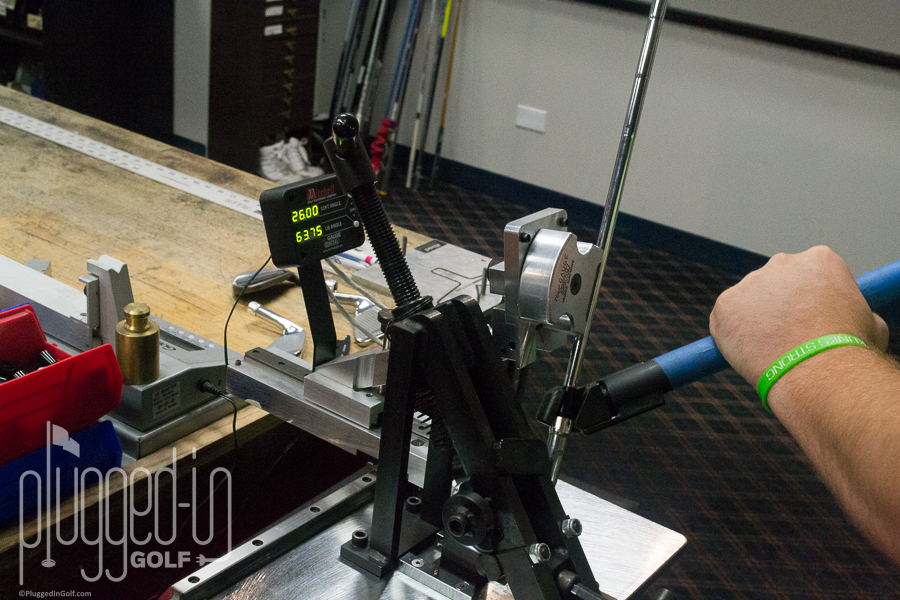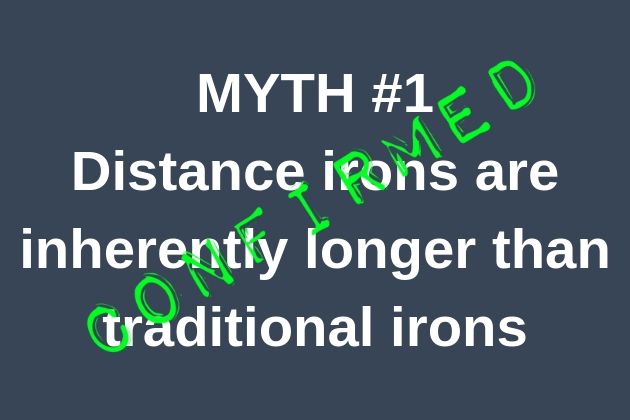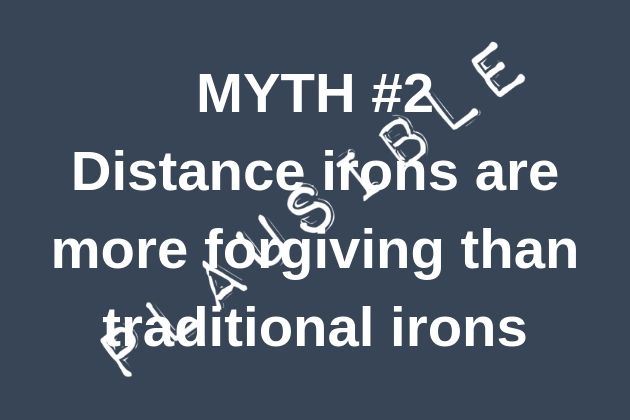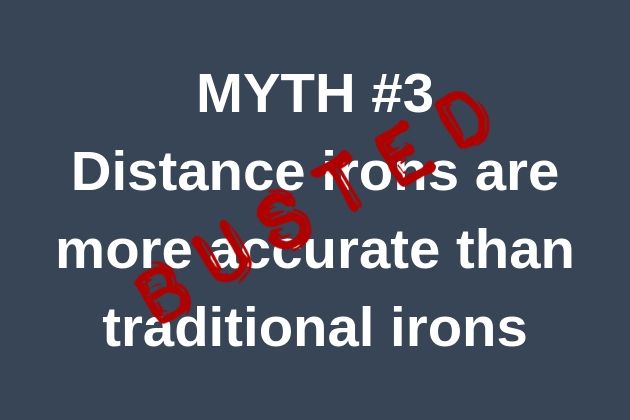 Are Distance Irons Longer Than Blades?
Are Distance Irons Longer Than Blades?
Posted by
Posted on
 Are Distance Irons Longer Than Blades?
Are Distance Irons Longer Than Blades?
In this edition of Golf Myths Unplugged, follow along to find out if technological updates have made distance irons a longer choice than blades.
The below article was originally published on pluggedingolf.com on September 30, 2019.
REVISITING A CLASSIC
Longtime readers may remember that five years ago we tested whether or not distance irons were really longer than traditional irons (check it out HERE). This has been one of our most often-referenced Golf Myths Unplugged, so we decided to try it again to see if iron technology has changed in the last half decade.

THE MYTHS
Myth #1 – Distance irons are inherently longer than traditional irons
Myth #2 – Distance irons are more forgiving than traditional irons
Myth #3 – Distance irons are more accurate than traditional irons
HOW WE TESTED
For this test, we brought together five golfers with handicaps ranging from scratch to nine. Each player chose an iron shaft that fit their swing and used it to hit four different iron heads. We used two distance irons – the TaylorMade P790 and Callaway Epic Forged – and two blades – the Callaway Apex MB and TaylorMade P730. All the irons had their loft adjusted to 27 degrees. Each player hit seven shots with each head, and all shots were recorded on Trackman.
All testing was done at, and with the help of, Club Champion.

THE RESULTS
In a surprising reversal of what we found five years ago, our testing showed that distance irons are longer than blades, even with equal lofts.
For the group average, the blade 6-iron carried 180.9 yards; the distance 6-iron carried 186.3 yards.
Individually, each tester had their longest average carry with one of the distance irons. Also, when we combined the distance irons and blade irons, the distance irons were longer.
Finally, when we looked at the longest shot each individual hit, the distance irons won again. In comparing the best shot of each tester, the longest distance iron shot was, on average, 8 yards longer than the best blade shot.
The biggest driver of this distance gap was ball speed. Each tester posted their highest average ball speed with a distance iron, gaining at least 1 MPH and as much as 4.5 MPH over the best blade.

While it would seem that a large, high tech iron would be more forgiving than an old school blade, we do not have data to show this definitively.
The first metric we looked at was the distance gap between a player’s best and worst shot. On average, the distance irons were only slighter better, and there was tremendous variance within the group. One tester had only 10 yards between his best and worst blade shots and nearly 20 yards between his best and worst distance iron shots. Other players showed the opposite pattern.
We also looked at the consistency of spin rates and launch angles. Again, the averages tilted very slightly toward distance irons, but individual tester’s results were all over the map.
Looking at smash factor further muddied the water. On average, the group had the same smash factor with the distance irons as with the blades.

Accuracy is something we didn’t discuss in the previous version of this test, and I was eager to see the results Contrary to popular belief, blades proved to be more accurate than distance irons.
When we grouped together the two distance irons and the two blades, the blades were more accurate for four of our five testers. Among those four, two saw substantial accuracy gains: over 2 yards closer to center per shot. The one tester who was more accurate with distance irons was only better by 0.3 yards per shot.
Looking at the irons individually, we saw a similar pattern. Four of our testers were most accurate with one of the blades. Additionally, four of our five testers were least accurate with one of the distance irons.
ADDITIONAL FINDINGS
One clear, though unsurprising, finding was that the distance irons produced much less spin. The two blade irons averaged 5,246 RPM. The two distance irons averaged 4,755 RPM, a difference of nearly 500 RPM or roughly 10%. This was true not only for the group, but for each individual as well.
The story of launch angle was much more muddled. There was no clear connection between launch angle and iron type. Some players launched the blades higher, others launched them lower.
When we looked at peak height, there was a small trend toward the distance irons creating higher shots. Three of the five testers had higher peaks with the distance irons. For four of the testers, the difference between irons was small – 1 or 2 feet. The one outlier created higher shots with the blades by a substantial amount – 8 feet higher on average.
One observation that we made while watching the testers is that sole width is an underappreciated factor in iron selection. Each of our testers had a clear preference for a particular sole width. When given a club that was dramatically different than their gamer, they struggled with turf interaction despite all being above average players.
THE TAKEAWAY
While rapid product cycles have made it easy to become jaded about whether or not golf clubs are actually getting better, this test shows that, when it comes to distance, irons are improving. The modern distance iron creates a ton of ball speed while lowering spin.
However, this does not mean that every golfer needs a modern distance iron. Each golfer should – with the help of a quality club fitter – determine what they need to get the most out of their golf swing to accomplish their goals on the course.
Matt Saternus — Co-Founder, Editor In Chief at PluggedInGolf.com
Matt is a golf instructor, club fitter, and writer living in the northwest suburbs of Chicago. Matt's work has been published in Mulligan Magazine, Chicagoland Golf, South Florida Golf, and other golf media outlets. He's also been a featured speaker in the Online Golf Summit and is a member of Ultimate Golf Advantage's Faculty of Experts.
With more than 60,000+ custom hittable clubhead and shaft options, Club Champion will find the perfect fit for you. Experience the Club Champion difference! Call us at 888-340-7820 or click here to Book A Golf Club Fitting.
- Categories: Blog
- Tags: Iron Fitting



